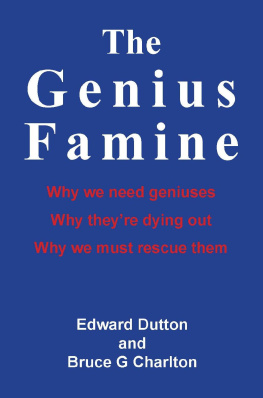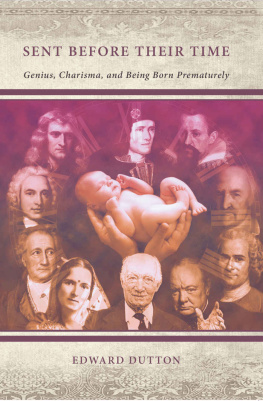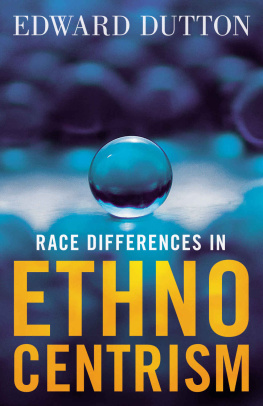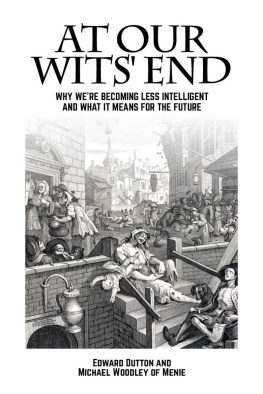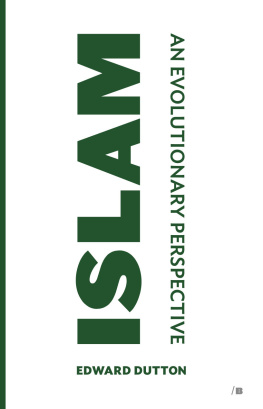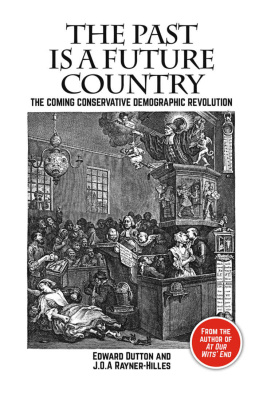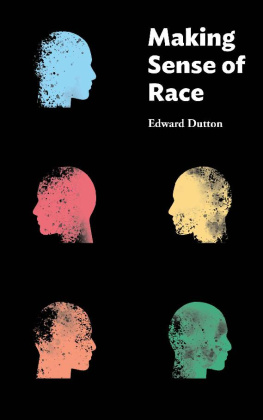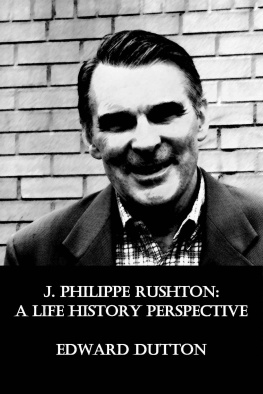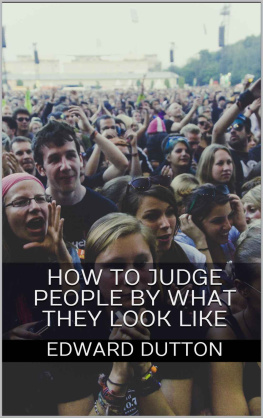Edward Dutton - The Genius Famine
Here you can read online Edward Dutton - The Genius Famine full text of the book (entire story) in english for free. Download pdf and epub, get meaning, cover and reviews about this ebook. year: 2016, publisher: The University of Buckingham Press, genre: Science. Description of the work, (preface) as well as reviews are available. Best literature library LitArk.com created for fans of good reading and offers a wide selection of genres:
Romance novel
Science fiction
Adventure
Detective
Science
History
Home and family
Prose
Art
Politics
Computer
Non-fiction
Religion
Business
Children
Humor
Choose a favorite category and find really read worthwhile books. Enjoy immersion in the world of imagination, feel the emotions of the characters or learn something new for yourself, make an fascinating discovery.
- Book:The Genius Famine
- Author:
- Publisher:The University of Buckingham Press
- Genre:
- Year:2016
- Rating:5 / 5
- Favourites:Add to favourites
- Your mark:
- 100
- 1
- 2
- 3
- 4
- 5
The Genius Famine: summary, description and annotation
We offer to read an annotation, description, summary or preface (depends on what the author of the book "The Genius Famine" wrote himself). If you haven't found the necessary information about the book — write in the comments, we will try to find it.
The Genius Famine — read online for free the complete book (whole text) full work
Below is the text of the book, divided by pages. System saving the place of the last page read, allows you to conveniently read the book "The Genius Famine" online for free, without having to search again every time where you left off. Put a bookmark, and you can go to the page where you finished reading at any time.
Font size:
Interval:
Bookmark:
The Genius Famine
Why we need geniuses,
Why theyre dying out,
and
Why we must rescue them
Edward Dutton
and
Bruce G Charlton
The University of Buckingham Press
Firstpublished in Great Britain in 2015 by
TheUniversity of Buckingham Press
YeomanryHouse
HunterStreet
BuckinghamMK18 1EG
TheUniversity of Buckingham Press
Themoral right of the authors has been asserted.
Allrights reserved. No part of this publication may be reproduced, stored orintroduced into a retrieval system or transmitted in any form or by any meanswithout the prior permission of the publisher nor may be circulated in any formof binding or cover other than the one in which it is published and without asimilar condition including this condition being imposed on the subsequentpurchaser.
CIPcatalogue record for this book is available at the British Library
ISBN9781908684608
Acknowledgements Bothauthors acknowledge the influence of Dr. Michael A. Woodley, both in generalterms and also in relation to several specific aspects of the argument of thisbook; although we take full responsibility for the use we have made of theseideas. In addition, Edward Dutton would like to thank Dr. Dimitri van derLinden for assorted stimulating conversations on the topics in this book. Hewould also like to thank his wife, Mimmi, and children Martha and Henry. BruceCharlton wishes to acknowledge the essential support and encouragement of hiswife, Gill; and his children, Billy and Nancy.
This book is about genius: what itis, what it does, where it comes from.
And about geniuses: especially why there used to be so manyand now there are so few; what was the effect of an era of geniuses, and whatwill be the consequences of our current Genius Famine.
This book describes the genius as an Endogenous personality;that is, a person of high intelligence combined with a personality driven fromwithin, an inner orientated personality: that is, a dominated by theCreative Triad of (1) Innate high ability, (2) Inner motivation and (3)Intuitive thinking.
When high intelligence and this type of personality areconfluent, a potential genius is the result. But to fulfil this potential the Endogenouspersonality must find and accept his own Destiny, and must undergo the trialsand tribulations of a Quest before he is likely to be rewarded by anIllumination: a breakthrough.
Even then, the breakthrough must be noticed, understood,accepted, implemented by society at large; and we describe how past societieswere much better at recognizing and making a place for the potential genius.Because the problem is that the Endogenous personality is usually an awkwardand asocial character at best; and often an actively unpleasant person and adisruptive influence.
Geniuses are altruistic, in the sense that their work isprimarily for the good of the group; and not for the usual social rewards suchas status, money, sex, and popularity.
Therefore many geniuses need to be sustained in a long-termway; and their work demands careful attention and evaluation.
We argue that modern societies, by means both indirect anddirect, have become hostile to genius and indifferent to the work of thoserelatively few remaining geniuses.
However, because the work of a genius is necessary andirreplaceable, we argue for a change of attitude. Modern society needs geniusesfor its own survival in the face of unfamiliar, often unprecedented, threats.Therefore, we must in future do a better job of recognizing, sustaining andaccepting guidance from as many geniuses of the highest quality that can be found.
ChapterOne
What is the Endogenous Personality?And why is he so important?
In a nutshell, we argue that the Endogenous personality isthe type of a potential genius a compound of abilities and attitudes, ofintelligence and innerness. As a strong generalization: the true geniuses areEndogenous personalities; and it is from Endogenous personalities that geniusesarise.
The Endogenous personality is the inner Man; a personwhose outlook on life is inward. He is inner-directed, inner-driven,inner-motivated; one who uses inner modes of thinking, inner evaluations,in-tuition; one who is to a high degree autonomous, self-sufficient; one who isrelatively indifferent to social pressures, influences and inducements.
He stands in stark contrast to the Exogenous personality;that is, to most people. The Exogenous Personality is orientated toward theenvironment, particularly the social environment. These are people who wantmore than anything else social (including sexual) status, worldly success;people whose perceptions are directed outwards and who try to align theirbehaviour with group norms.
When described in such terms, the Endogenous personalitymight appear anti-social, uncooperative, a dreamer, not the kind of person wemight wish to have to deal with on a regular basis. We would probably beaccurate in perceiving the Endogenous Personality in this negative way. Weprobably wouldnt want to go for a drink with him, let alone be friends withhim.
But he is important; he is very important. Because theEndogenous personality is the archetypal genius. He is the type of agenius whether a large scale, world historical genius of the highest levelachieved by humanity a Shakespeare, a Beethoven or an Einstein or a local,tribal, or town genius; a shaman, a sculptor, an inventor whose name isunrecorded (yet who might be the originator of some great but anonymous ballad,folk song, painting or a technological breakthrough such as the spade,spear-thrower, arch or stirrup).
Genuine breakthrough, world-impact creativity is so rare,so difficult (far more difficult than commonly imagined) that it requires aspecial kind of mind a mind especially designed for this kind of work (innerwork). There need not be many such men indeed, there should not be too many,since the necessary mind is relatively unfit for the primary, day-to-day,activities of survival and reproduction of the species. But such men are needed sooner or later, from time to time.
These are the people who (whether we know their names ornot) will almost-certainly be behind the scientific and technical breakthroughsthat are the motor of civilization, these are people whose can inspire andunite society moving it towards greater things or out of the depths of despairand ennui; these are the people who can rescue a society on the brink ofcatastrophe.
The Endogenous personality is recognized because when thiskind of creative personality is combined with high general intelligence, weget a potential genius of greatness in proportion to their ability.
So, an Inner, Intuitive personality plus high Intelligence(or another special ability) is the Creative Triad and equals the Endogenouspersonality, or potential genius. The high intelligence serves as a kind ofguarantee that the Endogenous personality is positively adapted by hislop-sided focus, and inclination to be a creative specialist problem-solver insociety; and is not merely a broken, sick or damaged individual who simply cannotparticipate in normal society perhaps through mental or physical illness.
The Endogenous personality will stay focused on a problemlonger than most men and he will look at the problem in a different way. Hewill deploy different (more inward) procedures of understanding more detached,more abstracting. Hence he is more likely to see something new and useful in anew and different way.
His stance is less personal. He stands back to a greaterextent than most. He sees the problem in a wider scope precisely because hesees the problem detached from normal personal concerns, such as status, sex,or wealth; none of which he really seems to care much about. For him, solving hisproblem is not a means to an end a way of gaining status, wealth or sex itis an end in itself. The inner man gets the greatest satisfaction from innerwork it is what he most wants to do.
Font size:
Interval:
Bookmark:
Similar books «The Genius Famine»
Look at similar books to The Genius Famine. We have selected literature similar in name and meaning in the hope of providing readers with more options to find new, interesting, not yet read works.
Discussion, reviews of the book The Genius Famine and just readers' own opinions. Leave your comments, write what you think about the work, its meaning or the main characters. Specify what exactly you liked and what you didn't like, and why you think so.

